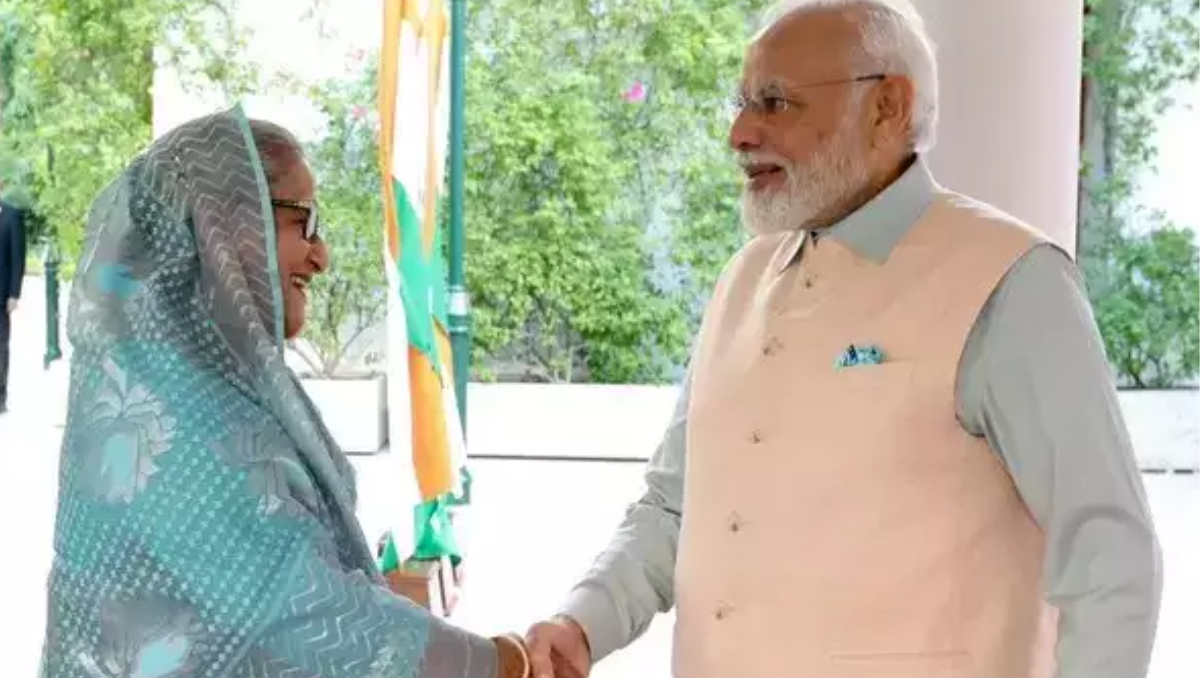The launch of India-Bangladesh power and rail projects underscores the importance of deeper partnerships and relations.
Through a video conference on Wednesday, Prime Minister Narendra Modi and his Bangladeshi counterpart Sheikh Hasina jointly launched three development projects with Indian assistance.
The Akhaura-Agartala Cross-Border Rail Link, the Khulna-Mongla Port Rail Line, and Unit – II of the Maitree Super Thermal Power Plant in Rampal, Bangladesh are the three projects under consideration.
The launch of projects in the rail and power sectors between Bangladesh and India highlighted the two nations’ growing relationship and links.
The simultaneous launch of these significant projects demonstrates the strong friendship and cooperative relationship between the two friendly nations. The Prime Minister of Bangladesh said, “I would like to thank PM Modi for the warm hospitality during my visit in September 2023 to attend the G20 Summit.”
(Image Source : The Indian Express)
Sheikh Hasina stated, “I thank you for your dedication towards strengthening the ties of friendship between our two nations.”
The Akhaura-Agartala Cross-Border Rail Link project is being carried out using funding provided to Bangladesh by the Government of India in the amount of ₹392.52 crore. With a 6.78 km Dual Gauge rail line in Bangladesh and 5.46 km in Tripura, the rail link has a length of 12.24 km.
With a total project cost of USD 388.92 million, the Khulna-Mongla Port Rail Line Project is being carried out under the Government of India’s concessional Line of Credit. The project calls for building a broad gauge rail line spanning around 65 km from Mongla Port to Khulna’s current rail system.
This allows Mongla, Bangladesh’s second-biggest port, to be connected to the broad-gauge railway system. The Maitree Super Thermal Power Project, a 1320 MW super thermal power plant in Rampal, Khulna Division, Bangladesh, is funded by a 1.6 billion US dollar loan under the Indian Concessional Financing Scheme.
Bangladesh Power Development Board and India’s NTPC Ltd. formed a 50:50 joint venture company, the Bangladesh-India Friendship Power Company Limited, to carry out the project. The region’s energy security and connectivity will be improved by these projects.
In preparation of Diwali, Sheikh Hasina also greeted Prime Minister Modi and the Indian populace during the inaugural event.
I would like to end by sending my best wishes for the forthcoming Diwali, said the Bangladeshi Prime Minister. She wished a very happy Diwali to Prime Minister Narendra Modi and the people of India.
The Bangladesh-India Friendship Dialogue has been a vital forum for enhancing bilateral ties between the two countries during the past ten years. ‘Fostering a comprehensive and mutually beneficial cooperation’ is the topic of this year’s Dialogue, according to BNN News.
The India-Bangladesh Friendship Pipeline, a cross-border energy pipeline, was officially opened earlier this March by Prime Minister Narendra Modi and Prime Minister Sheikh Hasina of Bangladesh. The pipeline’s estimated cost was ₹377 crore, of which the Government of India paid for grant assistance for approximately ₹285 crore, the cost of the Bangladeshi portion.
Transporting HSD from India to Bangladesh will become more economical, dependable, sustainable, and environmentally friendly with the opening of the India-Bangladesh Friendship Pipeline.
Furthermore, in September, Dhaka, Bangladesh hosted the 15th Meeting of the Joint Working Group on Trade (JWG) between India and Bangladesh. During this meeting, the two countries deliberated on a range of bilateral matters, such as the elimination of port limitations and the preparations for the start of the Comprehensive Economic Partnership Agreement (CEPA).
By lowering trade barriers, streamlining customs processes, and enhancing transit, logistics, and infrastructure to promote easier cross-border trade, these sessions are essential for swiftly settling bilateral disputes.
